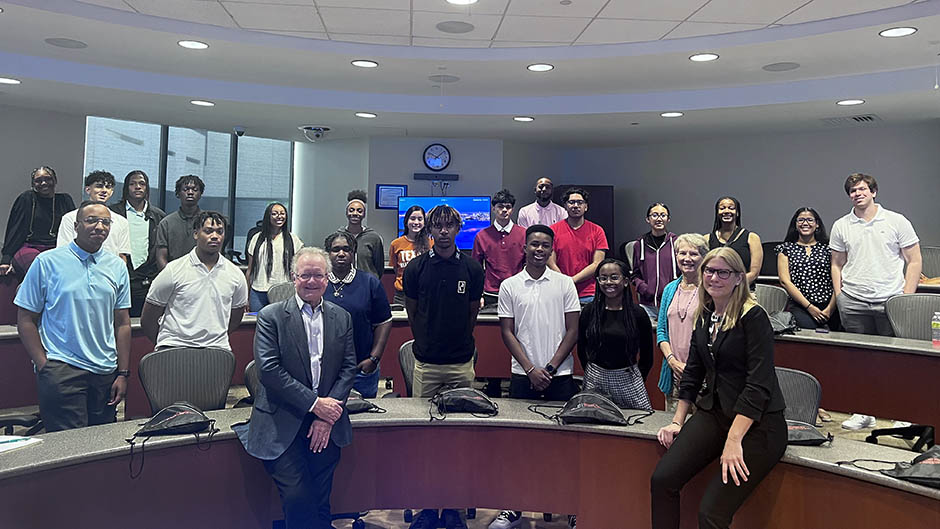From June 19 to July 1, African American and Latin American high school students from around the United States received an immersive experience in commercial real estate during the 2022 Real Estate Exchange (REEX) summer program, organized yearly by the Real Estate Executive Council (REEC). Rising juniors and seniors gathered at participating universities for the concentrated, two-week curriculum, which included guest speakers, social events, an UrbanPlan project, and a capstone project leading to a final competition with cash prizes.
For the fourth consecutive summer, the University of Miami participated as a top institution in real estate, this year joining the Massachusetts Institute of Technology, Harvard University, and Howard University. Select minority high school students received a first exposure to commercial real estate as a potential career path. The program hence expands opportunities to students of diverse backgrounds and aims to increase minority representation within the field.
“REEX carries out a very intentional recruitment of Black and Latino students to expose them to an area that they would not normally be exposed to in their regular schools,” says Aminata Sam, a graduate student in Miami Herbert Business School’s Accelerated MBA in Real Estate program and head coach for REEX’s UM group.
About 60 REEX students traveled to their respective participating institutions for the in-person experience after two years of pandemic-related virtual programming. As part of the Miami Herbert cohort, 15 students from across the country gathered at the University of Miami campus for course lectures and projects intermingled with social activities, such as a volleyball and beach day at the W Hotel in South Beach and site visits to Red Rooster restaurant and the historic Lyric Theater in Overtown.
During the capstone competition, teams of four or five within each university competed against each other in a semifinal round to determine a winning team that would move on to the finals. The project gave students the opportunity to envision solutions to challenged areas in their communities.
Miami Herbert’s semifinalist team, members Diani Tillman, Jakelin Diaz de Leon, Aron Medina, and Kennedy Miles, proposed Project Empower. The vision consisted of renovating a 60,000 square-foot lot in Overtown into an affordable, self-sustaining, diverse, and environmentally friendly design. A 48,000 square-foot, six-floor structure would offer retail, office, and residential spaces at affordable and market-rate options in a community-centric development aiming to reinvigorate a close-knit town that has become fragmented due to redevelopment.
“Overtown has gone through so much. Expansion that includes highways and trains has cut it apart and displaced people,” Sam explains. “We got to work on a site that would allow us not only to bring back some of the people that have left but also to bring in a whole new group of people to restore the community to what it once was, which was a very inclusive and nurturing community.”
Sam understands the potentially detrimental effect of urban transformations. Growing up in Brooklyn, she became displaced from her home during the gentrification of her neighborhood.
“I had no power. My parents had no power. We had to move from one part of Brooklyn to another,” she recalls.
When she transitioned from her initial career path in accounting to real estate, she realized that she can now have an influence in the industry. Her long-term goal consists of building an all-inclusive resort and synagogue in West Africa to help open the region to more visitors. Today, as an intern at L+M Development Partners, she already works on projects that consider community wellbeing.
“I just want people to have a place to live. Everyone deserves that, including the people who are moving into the neighborhood, but it should be at an affordability metric,” she says.
Her participation as a graduate student and head coach demonstrates that the impact of the REEX program extends to students beyond the current high school cohort. Similarly, Josvianny Rosa Alvarado, a Miami Herbert rising senior and real estate and marketing major, served as a mentor for one of the capstone teams during the semifinal round. She calls the experience “the highlight of my summer.”
“REEX is my opportunity to help other students of color pave their way into real estate. I chose to participate in the program because I know how important it is to have a positive role model and encouraging mentors,” she says, citing Finance Professor Andrea Heuson, who serves as the REEX curriculum director for UM, as her mentor.
At the final capstone competition, the Howard University team and a joint MIT and Harvard team took home first and second place respectively, as awarded by judges Tammy Jones, REEC board chairman and CEO and founder of Basis Investment Group, James Simmons, REEC board vice chair and CEO and founding partner of Asland Capital Partners, Diana Tucker, vice president of membership and chapter relations at NAIOP, and Christopher Thomson, executive managing director of industrial brokerage at Cushman & Wakefield.
Beyond the competitive element of the proposals, all students walked away with an understanding of the impact of commercial real estate on the communities involved.
“It is deeper than trying to make the most money out of a piece of land. It is not only about finance,” Sam says. “Making it mostly about profit would not be as fun or meaningful as adding the community element.”

